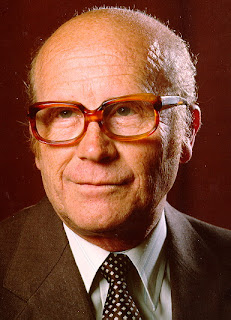 “The Holy Spirit did it. I don’t make nothing.” - Eduardo Bonnin
“The Holy Spirit did it. I don’t make nothing.” - Eduardo BonninEduardo Bonnin, founder of the Catholic lay Cursillo movement, died Wednesday at age 90.
A note on the movement's web site asked for prayers for the founder, who was born May 4, 1917. "Dear brothers and sisters in Christ, I send this message with a heart full of Christ's mercy and joy, to inform you of the passing to eternal life of our beloved friend, Eduardo Bonnin, founder of the Cursillos of Christianity, Feb. 6, 2008, in Mallorca," Victor Lugo, national executive director, wrote on the site.
The Cursillos of Christianity began in Spain, on the island of Mallorca, between the years of 1940 and 1949. "Numerous laymen and some priests, enlightened by the Holy Spirit, discovered very clearly the fact that laymen too, in virtue of the sacraments of baptism and confirmation, perform an active role in evangelization," the national secretariat site explained.
“Cursillo is not for the comfort of good people. Cursillo is for people far away from the church."
"Newspapers, radio, television don't give the solution to life. Christ gives the solution."
"You can't say to someone, 'You must go to church.' You say, 'You must be friends of mine.' When the bridge is built, then you can speak of Christ."
These ideas and others are part of the three-day weekend retreats that are the heart of Cursillo, a Spanish word meaning "short course." The retreats are experiences designed to give Christian and non-Christian alike what Bonnin says is more important than the ideas: "An encounter with yourself, with Christ and with your neighbour" that touches the heart and the emotion as well as the mind.
What Cursillo provides for many is not only an initial conversion experience, but also deep ongoing relationships through small groups and other events that challenge men and women to keep up the Christian commitments they have made during the retreats.
From its original start in Spain, the movement and its courses, have now spread all over the world, including to Ireland.
The retreats still use the same 13 talks on the fundamentals of Christianity that Bonnin and six others worked out for the first Cursillo retreat on the Spanish island of Mallorca in 1944. And although Bonnin said he could never have anticipated the movement would spread so far, he said they had hopes. Even at the first retreat, "We said we would never stop until we gave a Cursillo on the moon."
According to the founder, he read talks of Yves Congar and psychologists such as Carl Rogers, and then synthesized the ideas into short talks. "The Holy Spirit did it. I don't make anything,” he said in an interview in Canada some years ago.
One of the key concepts of Cursillo is to "be Christian and form community where we are." That's how Bonnin has spent his whole life.
Except for nine years of military service, he always worked in the family almond business on Mallorca. But he never married, and spent his holidays giving Cursillo retreats, and his weeknights visiting prisoners and befriending others.
Bob Robinson, from Cursillos in Canada spoke of Bonnin’s concern for others: of the prisoner he visited for 20 years, but never tried to convert, of the two hardened murderers he visited the night before their executions, and who went to the gallows with a smile because they had believed Bonnin's conversation-starter: "You are very lucky. You will see Christ tomorrow."
A wake for the beloved founder has been taking place since he died until today (Sat 9th Feb 08). The funeral will be celebrated on Tuesday(today) by Bishop Jesús Murgui of Mallorca.
